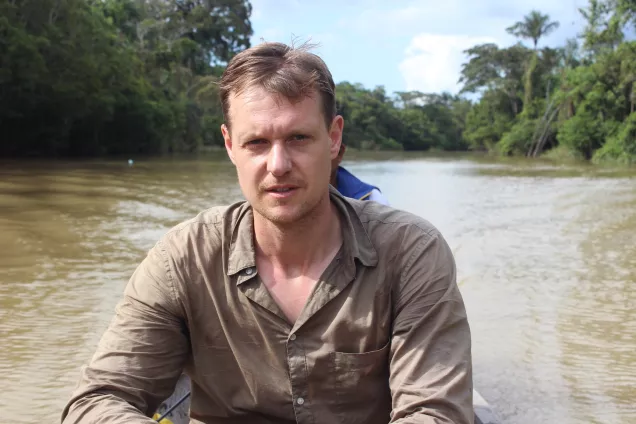The longer he his active in this region, the more convinced he is of the need for radical and systemic changes to maintain the Amazonian rainforest. These solutions should be both large scale and depart from local practices and Indigenous knowledges.
"What happens in the Amazon is deeply connected to the global economic system. Demand for minerals, timber, gold and agricultural expansion drives deforestation at a rate that puts increasing pressure on ecosystems and communities; communities who see very little benefit for themselves of all the attention and talk about the protection of the Amazon and the money that is earmarked for its conservation," says Torsten Krause, Associate Professor at Lund University Centre for Sustainability Studies, LUCSUS.
Over the years, he has seen deforestation increase, in spite of global and national initiatives on part of the nine countries that share the Amazonian rainforest. While deforestation fluctuate from year to year, the total area of rainforest being cut down is growing. With climate change and increased deforestation there are more severe droughts and forest fires, that further threaten the integrity of the Amazon biome. Already parts of Brazil are getting so dry that sensitive hydrological cycles, that the whole agricultural sector depend on, are at risk of collapse. The Amazon tipping point, that marks the turning point where parts of the biome will convert into a Savannah, is moving closer with every hectare of additional deforestation.
Ahead of the United Nations yearly Climate Change Conference, COP30, in Belém, Brazil, that runs from 10 - 21 November, he and LUCSUS PhD student Juan Antonio Samper are organising and attending a range of workshops and conferences in Perú, Colombia and Brazil to discuss the future of the Amazon under climate change. In focus will be how people can make an income from renewable natural resources in the Amazon without harming the forest. At COP30, their research will be presented at a side event entitled: The Need to Recognise Environmental Defenders in the UNFCCC Process: Voices from Latin America.
"Many of the solutions put forward at the COPs as green climate solutions, for example renewable energy, inevitably causes a new wave of mineral extraction that drives violence, degradation and pollution in the Amazon. We need to be aware of these trade-offs," says Krause.
Ban on extractive industries in the Amazon
Instead, he would like to see a complete ban on extractive industries in the Amazon, in particular gold and oil, but also copper, tin, nickel, bauxite, manganese, and iron ore. The cost, not just for the people who live there, but for the whole world is too great, as the Amazon’s biocultural value is unique and irreplaceable, he says.
"What do we value; and how do we want to live? These questions are really at the centre of all of this. If we value electric cars, gold, timber and oil, we will continue to bring irreversible destruction on this area," says Krause. "We also need to recognise how the illegal drug trade is creating tension, violence and upheaval in the region as well as polluting rivers and causing deforestation. The trafficking of drugs and gold mining is the driver of violence throughout the entire region."
Create markets for sustainable produce from the Amazon
He and his colleagues have instead through yearlong research identified alternative ways to support the communities in the Amazon to make a living, while also maintaining the sensitive ecosystem. These solutions are co-produced with Indigenous groups – as Torsten emphasises that he can never speak for them, only with them.
They include creating market chains for products that can be produced in the Amazon without harming the forest, such as Brazil nuts, essential oils, moriche, andaçaí fruits for example. Even cocoa, which is originally an Amazonian fruit, could be used to support a sustainable income, if managed carefully. Tourism is another avenue to make a living. Recognising people’s agency will be key, as well as supporting people to use their legislative powers to resist large corporations and groups that want to exploit the forest.
"I firmly believe that there are many paths open to preserve the rainforest and support the people who live there. They depend on a willingness to change how we live, and consume, a crackdown on illegal activities centred on the places of consumption and demand, and an openness in creating new markets for produce that are less harmful," says Krause.
Activities ahead of COP30
Torsten is participating in:
- The 11th FLARE (Forests & Livelihoods Assessment, Research, and Engagement) network conference in Lima, Perú from October 23 – 27, 2025.
- A workshop at the National University of Colombia Campus Leticia on “Territories, Knowledge and Transitions: dialogues for Sustainability in the Amazon.” On October 31, 2025 in Leticia, Colombia.
- The 2nd Symposium Amazon 2030 – “Sustainability Issues in the World's Largest Rainforest Region” in Manaus, Brazil from November 6 – 7, 2025.
Juan is participating in:
- An pre-COP event organized by the Nordic Council in Manaus from October 24-27, 2025
- A workshop at the National University of Colombia Campus Leticia on “Territories, Knowledge and Transitions: dialogues for Sustainability in the Amazon.” On October 31, 2025 in Leticia, Colombia.
The 2nd Symposium Amazon 2030 – “Sustainability Issues in the World's Largest Rainforest Region” in Manaus, Brazil from November 6 – 7, 2025.



